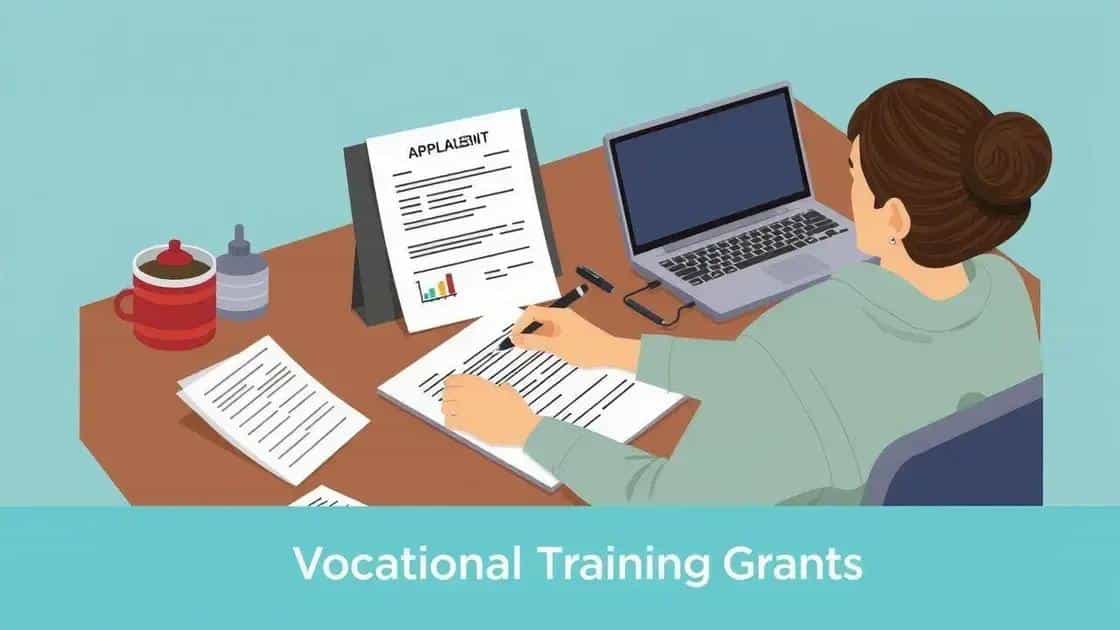Vocational training grants for displaced workers: a lifeline

Vocational training grants for displaced workers provide essential financial assistance to help individuals acquire new skills, improve their job prospects, and advance their careers after losing employment.
Vocational training grants for displaced workers are essential resources that can help individuals rebuild their careers after job loss. Have you ever thought about how a bit of financial aid could open new doors for you? Let’s dive into how these grants work and why they matter.
Understanding vocational training grants
Understanding vocational training grants is crucial for anyone looking to enhance their skills and improve their job prospects. These grants provide financial assistance to cover the costs of training programs, ensuring that displaced workers can acquire new skills without the burden of debt.
What are Vocational Training Grants?
Vocational training grants are funds provided by government agencies, nonprofit organizations, or educational institutions to help individuals pursue training or education in specific job fields. These grants typically do not require repayment, making them an accessible option for many.
Types of Vocational Training Grants
There are various types of grants available, each catering to different needs:
- Federal grants: offered by the government to support workers in high-demand fields.
- State grants: provided by individual states to help residents gain necessary skills.
- Private grants: funded by organizations or businesses, often targeting specific industries.
- Employer-sponsored grants: financial support offered by companies to encourage employee skill development.
Each type of grant has its own application process and eligibility requirements, so it is important to research the options available. Many grants aim to support learners in fields experiencing labor shortages, ensuring that education aligns with market demands.
Additionally, understanding the specific requirements to qualify for each grant is vital. Generally, applicants need to demonstrate financial need, commitment to complete the training, and alignment with career goals. Researching these factors can enhance your chances of securing funding and embarking on a successful career path.
As you explore various options, consider reaching out to local educational institutions or career centers that can provide guidance. They often have resources to assist with the grant application process and can help identify programs that meet your needs.
Eligibility criteria for displaced workers
Eligibility criteria for displaced workers are essential to understand when applying for vocational training grants. These criteria help determine who can receive financial assistance, ensuring the support goes to those who need it most.
Basic Requirements
To qualify for vocational training grants, displaced workers generally must meet specific basic requirements. Key criteria include:
- Proof of previous employment in a sector that is now declining or obsolete.
- Documentation of job loss, such as termination letters or unemployment benefits.
- Commitment to complete the training program and seek new employment opportunities.
Each grant may have its own specific stipulations, but these are common factors that most applicants must address. It’s crucial to gather all necessary documentation before starting the application process.
Additional Considerations
Besides the basic requirements, some grants include additional considerations to boost chances of approval. These may involve:
- Participating in workshops or information sessions about the grants.
- Having a clear career plan that aligns with job market needs.
- Demonstrating financial need, which may require submitting household income information.
Understanding these additional criteria can make a significant difference in securing funding. Each individual’s situation is unique, and being prepared can help when applying for various grants.
Considering all these factors, it’s advisable for displaced workers to seek assistance from local career centers or organization representatives. They can provide guidance on the eligibility criteria and help navigate the application process.
How to apply for vocational training grants

Knowing how to apply for vocational training grants can significantly enhance your chances of receiving financial assistance. The application process may seem daunting, but with some guidance, it is manageable.
Step-by-Step Application Process
The first step in the application process is to research available grants. Many websites list grants by category and eligibility. Once you find a suitable grant, make sure to read the guidelines thoroughly. Each grant has unique requirements, and understanding them is crucial to your success.
Gathering Necessary Documents
Next, gather all needed documentation. Common documents include:
- Proof of income or financial need, often required to demonstrate eligibility.
- Certificates or diplomas from previous education or training, showing your educational background.
- Letters of recommendation or references from previous employers.
- Any documentation related to job loss or displacement, demonstrating your need for training.
Having these documents prepared in advance can save time and ensure a smoother application process. Once you have your materials, follow the grant’s specific application instructions closely.
Submitting Your Application
When ready, submit your application by the deadline. Pay attention to submission methods, as some grants allow online applications while others require mail-in materials. Double-check that all information is complete and accurate to avoid delays or disqualification.
After submission, it is wise to keep a record of your application. You may want to follow up with the grant provider after a few weeks to confirm receipt and check on your application status. Remember, patience is key during this waiting period.
By understanding the application process and preparing accordingly, you can improve your chances of obtaining a vocational training grant. Don’t hesitate to reach out to local organizations or career centers for additional support and resources.
Success stories of grant recipients
Success stories of grant recipients can inspire and motivate those considering vocational training grants. These stories highlight real experiences and positive outcomes that come from obtaining financial support for education.
Real-life Examples
Many individuals have successfully transitioned into new careers thanks to vocational training grants. For example, one recipient, Maria, lost her job in retail due to economic changes. She applied for a grant and enrolled in a medical assistant program. After completing her training, she found a fulfilling job in healthcare, which also offered stable income and growth opportunities.
The Impact of Grants
Vocational training grants can change lives in many ways. They provide:
- Access to training for people who may not afford it.
- The opportunity to gain new skills that are in demand.
- A chance to improve financial stability through better employment.
Another example is John, who worked in manufacturing but was laid off. With a grant, he attended a coding boot camp. Now, he works as a software developer, significantly increasing his earning potential.
These stories emphasize the importance of seizing the opportunity that grants provide. Many recipients report increased confidence and satisfaction after finding new jobs in their desired fields.
Community Benefits
The benefits of these stories extend beyond individuals. When displaced workers receive training and find jobs, communities also thrive. Increased employment leads to stronger economies and can help revitalizing local areas.
Besides personal success, these stories showcase how vocational training grants contribute to building a skilled workforce, which ultimately supports overall community growth.
Impact of training grants on career advancement
The impact of training grants on career advancement is significant and multifaceted. Many individuals have discovered that these grants open doors to new opportunities and help them gain valuable skills.
Enhancing Skills and Knowledge
Training grants provide financial resources for displaced workers to enroll in vocational programs. By attending these programs, participants acquire skills that are highly sought after in today’s job market. This not only improves their job prospects but also allows them to consider new career paths.
Accessing Higher-Paying Jobs
With the right training, many individuals can transition into roles that offer better salaries and benefits. For example:
- Healthcare training can lead to jobs such as nurses or medical technicians.
- Technical skills training can result in high-demand positions like IT specialists.
- Trade skills can lead to work as electricians or plumbers, which are often well-paying.
The skills learned through these programs give workers the tools they need to pursue higher-paying jobs and build stable careers. The financial burden of training can often be a barrier, but grants alleviate this issue, making it possible for more individuals to advance professionally.
Long-term Career Growth
Beyond just securing immediate employment, training grants can lead to sustained career growth. As individuals gain experience and continue to learn, they become eligible for promotions and additional responsibilities. Many grant recipients find that returning to school is a stepping stone to further education and advanced certifications, which enhance their career prospects even more.
Additionally, employers often value candidates who are proactive about their education and training. This can lead to better job stability and opportunities for advancement, creating a positive cycle of growth and improvement.
Overall, the impact of training grants on career advancement cannot be understated. They not only help individuals start new jobs but also lay a foundation for long-term success and fulfillment in their careers.
FAQ – Frequently Asked Questions About Vocational Training Grants
What are vocational training grants?
Vocational training grants are financial aids provided to individuals to help cover the costs of training programs that teach specific skills for employment.
Who is eligible for vocational training grants?
Generally, displaced workers who have lost their jobs due to economic changes can qualify for these grants, but specific eligibility may vary by program.
How can I apply for a vocational training grant?
To apply, research available grants, gather necessary documentation such as proof of unemployment, and follow the specific application instructions for each grant.
What impact do training grants have on career advancement?
Training grants help individuals gain valuable skills, access better job opportunities, and ultimately lead to higher-paying positions and long-term career growth.





